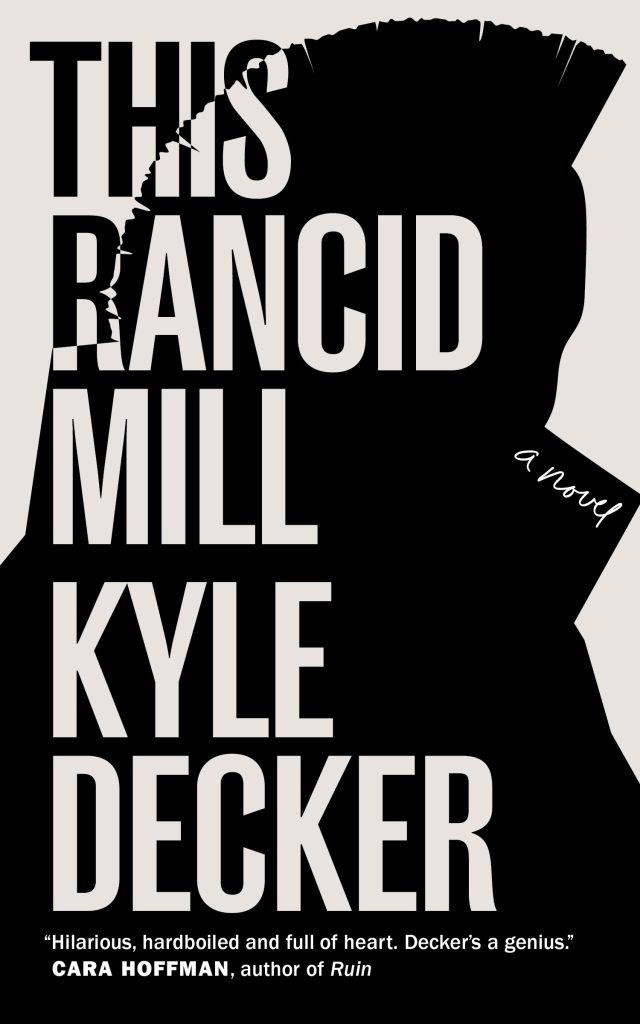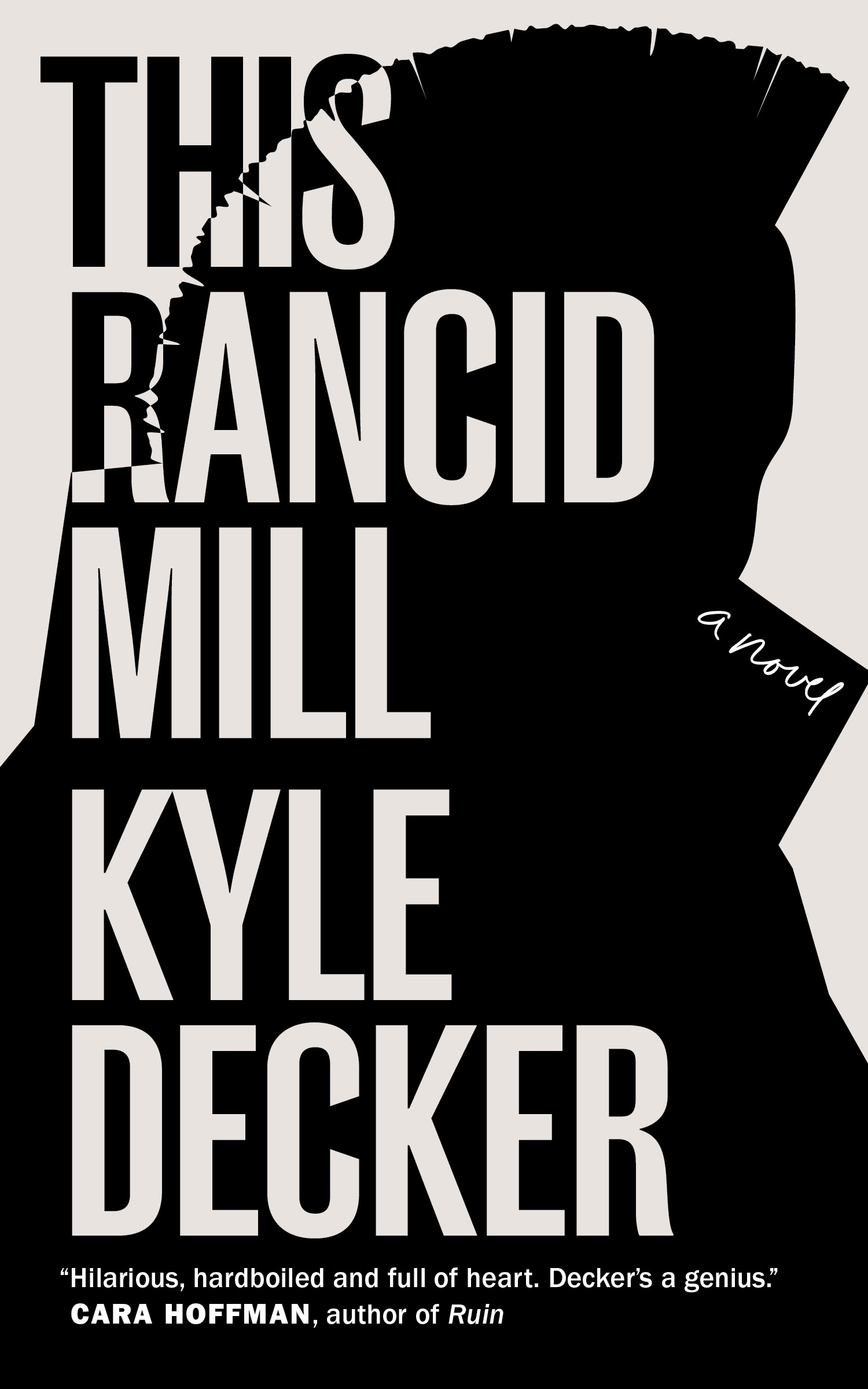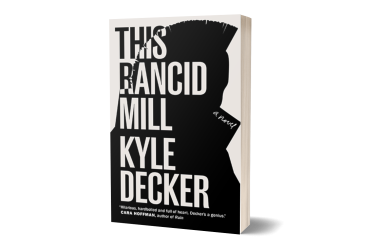By Kyle Decker
April 4th, 2023
The punk rock literary canon is extensive. However, the largest chunk of punk lit finds itself on the non-fiction shelf. Dozens of biographies, memoirs, essay collections, and oral histories have been released over the years. A few even take a prose-like approach that makes them indistinguishable from a novel, and a lot of them are damn good reads.
There are, however, stories centered around punk culture birthed entirely from the imaginations of their authors. Here is a list of ten punk-centric novels that I’ve read and enjoyed. This is in no particular order because who the hell am I to tell you that? Any article that says crap like “Top 10 Punk Rock Novels RANKED” (“ranked” is always in all caps) is pure clickbait and, more than likely, totally arbitrary. It’s doubtful they’re working from a point system based on a rubric of pre-specified criteria when determining the order. This is not a “Top 10” and is by no means exhaustive. I read these. I liked them. You might too. Simple as that.
That said, most people just skip these intros and go straight to the list anyway. So, without further ado…
Hairstyles of the Damned by Joe Meno (Punk Planet/Akashic Books, 2004)
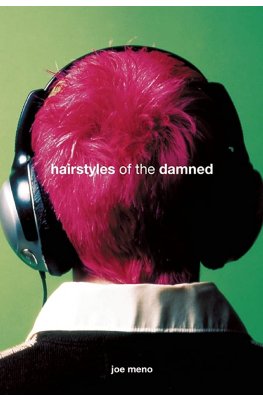
Set during the mid-90s punk revival, Joe Meno’s novel follows Brian Oswald, a misfit attending a Catholic high school on Chicago’s south side. Specifically, in and around Mt. Greenwood. The book is full of relatable growing pains. As is typical of bildungsroman, we follow Brian as he attempts to build and maintain his identity. He starts off as a bit of a geek before his friend Gretchen (with whom he is very much in love) introduces him to the punk scene. After a falling out with Gretchen, he tries being a stoner and skateboarder and eventually drifts back to being a punk. Brian’s not the only one experiencing growing pains either. The same can be said of his community and its simmering racial tensions as the demographics of the neighborhood start to shift. Beginning with the microcosm of students disagreeing on themes and music for the school dance, it eventually grows into something more violent and sinister.
This is an especially interesting read if you’re from Chicago or its suburbs. The use of real locations provides a whole extra level of appreciation for those in the know. A number of scenes are set at Haunted Trails (a family fun center in suburban Burbank, IL) and there’s even a reference to Off the Alley, a small music venue that was in Homewood, IL up until the late 90s/early 2000s.
Brian has a narrative voice that will inevitably draw comparisons to Holden Caulfield. But to his credit, Brian’s got his own distinctions. He has that cynical shell hiding a heart, for sure. But Brian seems to have a stronger sense of honesty than Holden. Unlike Holden, Brian does seem to legitimately care about more people. He’s less detached. Less self-righteous. Although, one thing more sensitive readers may want to keep in mind is that Brian is a teenage boy in the mid-90s and he talks like a teenage boy in the mid-90s. Which, though it rings authentic, is less “PC” by the standards of 2023. I don’t mean that as a gripe on Brian’s choice of words or how “people have gotten too sensitive these days.” Brian is a teenage boy from the mid-90s, he should talk like a teenage boy from the mid-90s. It’s just something to keep in mind going in.
Fat Kid Rules the World by KL Going (Penguin, 2004)
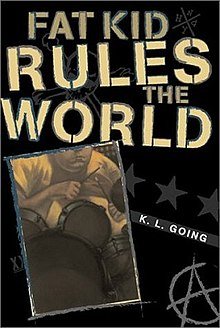
2004 saw another punk-centric YA novel released into the wild. Fat Kid… was even turned into a movie directed by Matthew Lillard (who himself starred in the movie SLC Punk). Author K.L. Going sticks us in the head of Troy Billings. Being 6’1” and just shy of 300 pounds allows for a pretty sizable target to be painted on Troy’s back. Plagued by bullies, health issues, and relentless suicidal ideation, Troy is about ready to step in front of a New York subway, when he’s saved (through some room reading distraction) by Curt MacCrae, a gutter punk, musician, and a drop-out from Troy’s high school.
Curt takes Troy under his wing and encourages him to become a drummer in his new punk band. Thing of it is, Troy’s never touched a drum kit in his life. He does, however, take to it and gets active in the scene, which provides him with a sense of purpose and belonging and all the confidence that comes with it. All of which had previously eluded him. However, when Curt’s own demons and addictions start to show themselves, Troy is in a position to return Curt the favor of saving his life. Though it follows a fairly common theme in punk fiction of discovering punk and it “saving one’s life”, it has heart to spare and the bond that the two main characters form is genuinely moving.
American Skin by Don De Grazia (Simon & Schuster, 1998)
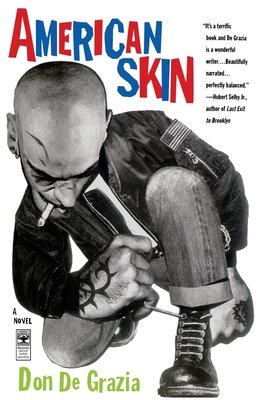
Another Chicago-centered novel, Don De Grazia’s American Skin is more punk-adjacent than punk-centered. As you might figure from the title, the novel is about skinheads. Although, the protagonists are of the anti-racist variety and are at war with a local group of racist skinheads. So not punks specifically, there’s a lot of overlap in the music and culture and the attitude of the narrative definitely lives in that overlapping space.
When Alex Verdi’s hippy parents are arrested for having a pot farm, Alex goes on the run and winds up in Chicago. There he befriends a group of anti-racist skinheads who help him find a place to stay: a nightclub called The Gorgon (a clear homage to the early Chicago punk club Medusa’s). The charismatic leader of a local Nazi skinhead gang keeps attempting to recruit him, but Alex’s found family helps stave off the dark side. Alex falls in love (twice), receives lectures on the history of skinhead culture, gets caught up in a race war, goes to college, the army, and, for a short time, jail.
While reading this book, I go back and forth between liking Alex and finding him to be an insufferable douchebag. He is, at times, a sensitive and thoughtful dude, but he also does absorb some of the eye-rolling machismo present among skinheads, soldiers, and convicts. Especially when he goes through his basic college-age white dude fascination with Ayn Rand. Even though he’s not always likable, he is, for the most part, interesting. Human beings are dichotomies, to be sure. Part of what adds to the book’s drama and appeal, in my opinion, is that you’re never fully sure how you feel about the narrator. Still, you want to find out what happens to him next, and which of his flaws he’ll manage to overcome.
Born to Rock by Gordon Korman (Little Brown, 2006)
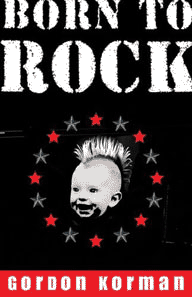
Korman’s protagonist Leo Carraway breaks from punk fiction tradition by being perhaps the least “punk rock” character of all time. He’s the head of his high school’s Young Republicans Club, already has an investment portfolio, and a full-ride scholarship to Harvard. Which isn’t to say he’s a bad dude. Just that, by counter-culture standards, he’s an absolute tool.
Because we live in a world where no good deed goes unpunished, Leo gets accused of cheating after helping someone with an assignment. The accusation and resulting scandal are enough to lose Leo his scholarship to Harvard. But not his acceptance. Leo does, however, discover that his mother, in her younger and wilder years, was a groupie for the still popular punk rock band Purge. There is reason to believe that the frontman, King Maggot, is his biological father. Leo decides to spend his summer working as a roadie for Purge, hoping to guilt Maggot into paying his tuition. Hijinks and drama, inevitably, ensue.
Leo being the Harvard-bound Young Republican type doesn’t necessarily work against him here, however. Tossing a guy as clean-cut and buttoned-down as Leo into the world of punk rock makes him an outsider among outsiders. He works as a surrogate for readers who aren’t fully familiar with that world, and they learn as he learns. Readers familiar with that world will get a kick out of watching him learn. Though, for me, the most fascinating character is King Maggot. His down-to-earth demeanor seemingly contradicts his rage-spewing on-stage persona. Before each show, Maggot goes into an anti-Zen meditative state in which he focuses on everything that makes him angry in order to get into the mindset he needs to perform. As someone who has fronted punk bands before, I think about and relate to this a great deal. When you’re on stage, you almost become someone else. Sort of like what Henry Rollins once said of Iggy Pop. “There’s two guys. There’s Jim. Jim Osterberg. And then there’s Iggy Pop.”
Born to Rock, like a couple of other entities on this list, falls into the YA category. Which, like with the others here, should not be held against it. There are a lot of great YA out there that do not involve trilogies or multi-part epics about chosen ones and teenagers leading rebellions against some sort of dystopian leadership. There is down-to-earth, everyday life YA as well. Born to Rock fits into this latter category. It’s just a fun breezy self-contained story.
Scraper: A Novel About Punk by James Gilberd (2015)
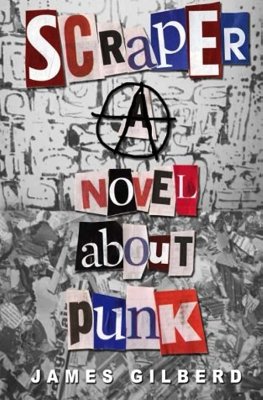
This novel earns some punk points because I’m pretty certain it was self-published. So it’s got the whole DIY ethos thing going for it. Probably. It also, for me, was one of the more “educational” in the sense that it focuses on a part of the world I didn’t know anything about at the time.
Set in New Zealand in 1981, Scraper revolves around Steve, a teenage punk who forms the eponymous band Scraper. Another punk rock bildungsroman, Gilberd’s novel follows Steve through his various dramas and run-ins within his community. Not being a Kiwi myself, it did take me a little bit to catch on to the fact it was set in New Zealand, as I’m less familiar with locations and history. The real crux of the novel’s drama revolves around the controversy surrounding the Springbok rugby tour in 1981. The Springboks are the rugby team from South Africa, which in ‘81 was still under apartheid. So, when their tour included a stop in New Zealand against the All Blacks (New Zealand’s rugby team), some controversy was sure to follow. Steve’s community, punk scene, family, and, hell, country are divided over the upcoming match. Some protest, calling for a boycott of the game. Others couldn’t give a toss and are angered that their favorite form of escapism is being politicized. And, of course, there are those who are just outright racist about the whole thing. Despite coming out a year before the Colin Kaepernick kneeling dispute, and the actual events it’s based on happening thirty-four years prior, parallels can easily be drawn.
Steve is forced to take a stance and uses his band to speak out against apartheid and the Springbok tour. This, in turn, puts him at odds with his father, a dyed-in-the-wool All Blacks fan. Part of growing up for many people is reaching a point where they find their own principles conflicting with those of their parents. Steve takes us on his own version of this human struggle to develop identity, all the while chowing down on fish and chips and expressing that angst through his music.
Hongdae Fire by J.A. Dunbar (bROKe Publishng, 2020)
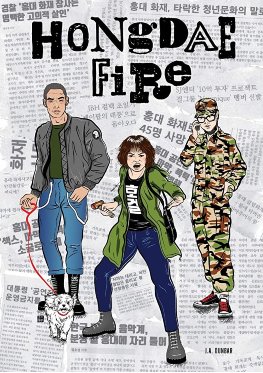
Hongdae Fire is near and dear to my heart because it is set in the punk scene in South Korea, which I was part of from 2013-2018. Mind you this book is set a good decade or so before I was part of it, it was still interesting to me because I could perfectly picture some of the locations. I also kept trying to guess if characters or bands were based on anyone I knew personally. Hongdae Fire digs into contemporary issues that clearly mean a great deal to author J.A. Dunbar, a journalist and long-time Seoul resident. Including gentrification and pseudo-Christian religious cults.
Set in Hongdae, a gentrifying arts neighborhood in Seoul, the opening chapters see a fire in a punk club wipe out all but a handful of members in the Seoul punk scene. Various details of the fire raise immediate red flags and Journalist Woo Yoo-kung begins to suspect foul play. Yoo-kung, herself a punk, had narrowly avoided the tragedy herself. Her survivor’s guilt catalyzes a quest to uncover the truth and get justice for her found family. As it is with most noir-ish mystery stories, everything goes much deeper (or rather much higher) than it seems at first. Standing between her and the truth are cops, firemen, a cult, landlords, property development companies, and government officials. Luckily she’s got the surviving punk community and her brother, on leave from his compulsory military conscription, on her side.
It’s a fun, well-paced read, and the characters are layered, charming, and will change how you think about Donald Duck. Yook-young herself subverts just about every aspect of an “ideal” Korean woman, and reminds me, more than a little, of a few people I know. Korean culture is on fire these days, and it’s cool to see something that antithesizes K-Pop and digs into Korean counter-culture. Which is, and again I say this from experience, amazing.
F.T.W.: Rise of the Anarchy March by Russ Lippit (Ravenhawk Books, 2020)
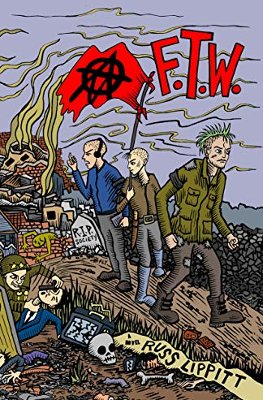
In Russ Lippit’s bleak post-apocalyptic nightmare “F.T.W.” does not stand for “For The Win.” Yeah. You got it. The abbreviated title definitely sets the cynical tone. Unlike a lot of other punk fiction, this breaks out of the “becoming punk” trope. It’s straight-up genre fiction that’s centered around characters who happen to be punks. If you’re a fan of the Fallout video game franchise, this is pretty damn close to a Fallout novel. But, like, if Henry Rollins were playing a run-through.
F.T.W. is set in a post-apocalyptic America that has been divided into zones. Each zone has its own culture, status, and leadership, but the country is still largely overseen by an oppressive government called the Prominent Municipality. Which, with respect to Lippitt, is one of the most hysterically satirical names for an oppressive regime that I’ve come across. A group, called the Anarchy March, is attempting to overthrow said government. It’s, overall, pretty typical post-apocalypse fair on its surface. But it moves at a brisk pace and no one has plot armor. Lippit knows when to shift perspectives too. Which is almost always with a cliffhanger. You’ll keep turning pages to see if the characters are okay or really have met a horrendously violent end.
The story follows Doyle and his small Anarchy March unit which includes both his fiancee, Darla, and best friend, Jack as they traverse the various zones of the former west coast with information and weapons that could turn the tide of the war. Naturally, this puts them in the crosshairs of a cartoonishly sadistic General who always seems to be casting a shadow over every fresh footprint they leave. The group gets split up and their attempts to reunite are met with tragedy, betrayal, and ultra-violence. Heads get shot, flesh gets melted, and Lippitt spares no detail in describing it. It’s just over the top enough to keep it from being disturbing. Although, it’s still very much capable of breaking your heart.
It’s bleak, yet not utterly hopeless, but like any good post-apocalyptic genre fiction you gotta dig through some rubble to find it. I’ll put it this way: Had Harlan Ellison been really into Youth Brigade, he might have churned out something like F.T.W.
Punk Rock Jesus by Sean Murphy (Vertigo, 2013)
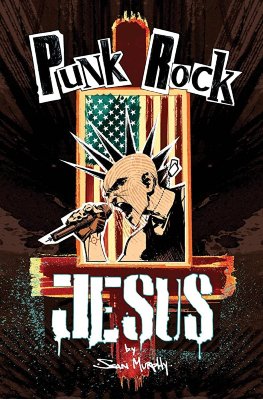
Sean Murphy’s Punk Rock Jesus distinguishes itself from the other entries on this list by being a graphic novel. This wonderfully cynical satire has a premise so absolutely bonkers that it’s incredibly believable. Jesus is cloned from blood samples taken from the Shroud of Turin and placed in a surrogate mother. Once he is born the clone of Christ, who everyone calls “Chris”, is raised on a reality show and broadcast worldwide. He finds a father figure in his bodyguard, a former member of the IRA. After tragic events involving his mother, “Chris” begins to rebel and digs into his bodyguard’s punk rock record collection, studies science, and openly rejects his faith. To the horror and awe of Christians the world over he begins a new life as a frontman for the Flak Jackets, the world’s last remaining punk band. Obviously, this ultimately draws the ire of world and religious leadership.
Murphy’s hyperkinetic art style suits the story’s energetic and dark tone. Its rough, sketchy edges bring to mind fliers for punk rock shows. Neither religion or the media comes out of this story looking good. And nor should they, in my opinion. The satire is savage, shocking, and heartbreaking.
Hard Core Logo by Michael Turner (Arsenal Pulp Press, 1992)
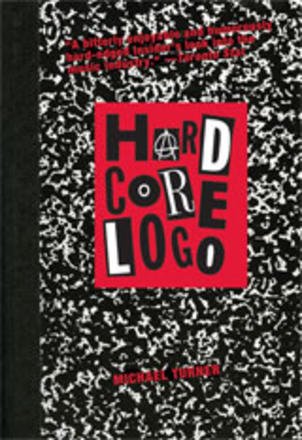
Another book on this list to get the movie adaptation treatment is Hard Core Logo. The book is an epistolary novel. Meaning it is told through a series of documents, interview transcripts, letters, and journal entries. Appropriately, the 1996 Canadian film adaptation from director Bruce MacDonald and screenwriter Noel S. Baker (and distributed in the US by Quentin Tarantino) takes the form of a mockumentary.
Both the novel and film follow seminal punk band, Hard Core Logo, on an ill-fated reunion tour through Canada. Frontman Joe Dick coaxes his estranged bandmates to briefly reunite for one last shot. He even manages to guilt his long-time best friend and guitar player Billy Tallent into agreeing. Billy, unlike the rest of the band, has been doing well for himself and has a chance at the big time without Joe’s help. Of course, past resentments start to resurface and boil over.
Hard Core Logo’s unique format allows us into multiple points of view. Unlike most entries on this list, which use first-person or third-person limited points of view, we’re allowed inside the heads of multiple people. Although the axis of the drama is Joe and Billy. Like a lot of epistolary novels, the reader does have to piece some stuff together on their own. It almost feels like you’re on a jury or a detective being presented with evidence and coming to your own conclusions based on the information given to you.
When the movie came out, they actually recorded music by the band and even went so far as to record a tribute album by various punk bands. It’s hard to dig up, but it’s worth it. And yes, the Canadian punk band Billy Tallent takes their name from the character in the book.
This Rancid Mill by Kyle Decker (PM Press, 2023)
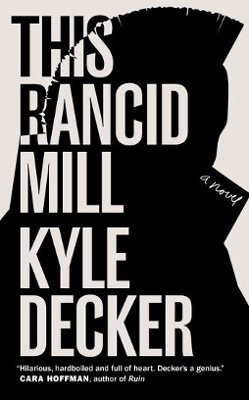
Yes. This is shameless self-promotion. I will admit it. Freely. But then again, that’s why a lot of articles like this one are written in the first place.
This Rancid Mill by Kyle Decker (ie: me) is a hardboiled detective novel in the tradition of Raymond Chandler but set in the midst of LA’s shifting punk scene during the early summer of 1981. Alex Damage eschews traditional economics by offering “favors for favors.” Although he accepts money when people can pay, his services as an unlicensed private eye for punk kids are largely paid back through appreciation for the services rendered in the form of free drinks and food. When the singer of Bad Chemicals, one of his favorite local bands, winds up dead, Alex is hired by the dead man’s girlfriend to look into possible foul play. His mission inevitably puts him in the crosshairs of the singer’s many enemies. The further Alex digs into the late singer’s unsavory secret life, the more Alex begins to question if the man even deserves justice. And causes Alex to reexamine some of his old attitudes and behavior.
This Rancid Mill draws from the post-#MeToo zeitgeist. The realization that people we’ve looked up to are capable of disgusting behavior has invited, or should invite, a great deal of reflection. Not just about the flawed nature of celebrity worship, but also about ourselves. There isn’t a man alive who hasn’t done something to make a woman uncomfortable at some point in their life. What have I done? What can I do better? How can I do better? These are all questions we should ask ourselves. Alex’s story asks its readers to take on those same reflections.
I worked on this book for a long time. The research involved reading a bunch of the non-fiction books I alluded to in the introduction you probably skipped over and watching countless documentaries, and even digging up some collected editions of old ‘zines. That said, the narrative voice, the dialogue, the pacing, and especially the characters are all very important to me. So I hope you enjoy spending time with all my imaginary friends.
Oh, and like Hard Core Logo, Bad Chemicals has some real music floating around out there in the form of a five-track E.P.
Honorable Mention: An American Demon by Jack Grisham (ECW Press, 2011)
An American Demon gets an honorable mention here because it’s branded as a novel but also doubles as a memoir, which technically disqualifies it. It draws very heavily on Grisham’s life, childhood, and time fronting T.S.O.L. It’s honest and brutal, and he does not allow himself any grace when describing his horrendous past behavior, some real, some (hopefully) exaggerated, and some outright fictional. Grisham keeps in the tradition of Hunter S. Thompson by blurring fact and fiction to the extent you aren’t sure which is real, embellished, or totally fake. It is, ultimately, a story of redemption and reflection. Grisham inserts some supernatural and religious elements into the narrative as well, which is what makes it technically a novel. But given that it is largely a memoir, it remains off the main list.
Although one might share Dave Eggers’s philosophy that memoir is closer to fiction than nonfiction because memory is subjective and unreliable. With that in mind, it’s still worth an honorable mention.
